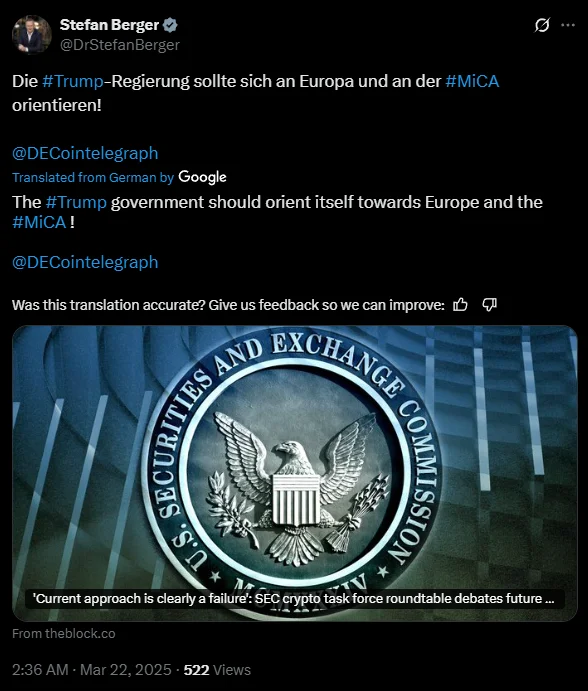Member of the European Parliament (MEP) Stefan Berger has called for the Trump administration to align its policies with Europe's Markets in Crypto-Assets (MiCA) standards. Berger made this statement in a post on X dated March 22.
"The Trump government should orient itself towards Europe and the MiCA," said Berger.
Berger referenced an article from The Block, dated March 21, 2025, which reported that the United States Securities and Exchange Commission's (SEC) crypto task force is shifting away from its previous "regulation by enforcement" approach. Miles Jennings, General Counsel for a16z crypto, described the past strategy as a "failure" and emphasized the need for a new direction. Commissioner Hester Peirce referred to this shift as a "restart" for the Commission’s efforts in regulating cryptocurrencies. The panel also revisited the ongoing debate regarding what qualifies as a security, questioning whether investor intent alone should be sufficient to define an asset as such.

Stefan Berger's post
| X
The SEC's Crypto Task Force is focused on clarifying the security status of crypto assets and identifying areas beyond its jurisdiction. It is reviewing no-action letter requests and considering offering temporary relief for token offerings if entities update disclosures and accept SEC oversight in fraud cases. The group will evaluate changes to Regulation A and crowdfunding related to token registration, update rules for special-purpose broker-dealers, and address custody solutions for investment advisers. Additional priorities include creating regulations for crypto-lending and staking, developing policies for exchange-traded products, and establishing cross-border regulatory frameworks, according to Peirce.
According to the European Union (EU), MiCA establishes uniform rules for crypto-asset issuers and service providers not covered by existing EU laws. It aims to ensure transparency, consumer protection, and market stability with specific obligations for different types of crypto-assets, including e-money and asset-referenced tokens. The regulation will be effective from December 30, 2024, with provisions on governance, disclosure, preventing market abuse, and oversight by EU authorities like the European Banking Authority (EBA) and European Securities and Markets Authority (ESMA).
Berger represents North Rhine-Westphalia as an MEP for the Christian Democratic Union (CDU), covering regions such as Lower Rhine, Düsseldorf, and Mettmann since 2019. He serves on the Committee on Economic and Monetary Affairs (ECON), focusing on competition, digitalization, innovation, and crypto assets.





